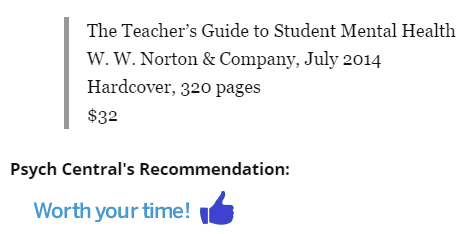Teachers need two kinds of information about children's mental health issues. First, they need to have an understanding of the different mental health disorders that affect children and adolescents and to understand how these disorders manifest within the classroom environment. Secondly, they need to know and utilize teaching methods that have been shown to be effective for individuals who have emotional and/or behavioral problems. This paper, in slide format, explains clear actions educators can take to improve the experience of students with emotional and behavioral problems.
|
I recently added a new presentation to the website, Adopting Evidence-Based Teaching Methods for Students who have Emotional/Behavioral Problems. This is a PDF of a talk I first presented at the Education Minnesota 2014 conference. It provides an overview of teaching methods that result in improved academic performance and reduced behavioral difficulties.
Teachers need two kinds of information about children's mental health issues. First, they need to have an understanding of the different mental health disorders that affect children and adolescents and to understand how these disorders manifest within the classroom environment. Secondly, they need to know and utilize teaching methods that have been shown to be effective for individuals who have emotional and/or behavioral problems. This paper, in slide format, explains clear actions educators can take to improve the experience of students with emotional and behavioral problems.
1 Comment
 I am happy to report that Choice Connect, a publication of the American Library Association, gave a “Highly recommended for all readership levels” review of my book, The Teacher’s Guide to Student Mental Health. The reviewer wrote, “The Teacher’s Guide to Student Mental Health is a practitioner-friendly resource that serves as a comprehensive road map for understanding school mental health and the implementation of evidence-based practices across classroom settings. A leading expert in his field, Dikel (child and adolescent psychiatrist) embeds years of clinical and field experiences into three distinct sections ('Why School Mental Health?' 'The Scope of Mental Health Disorders Affecting Children and Adolescents,' and 'A School’s Mental Health Framework') and strategically guides readers through the complexities of such timely topics. The wealth of knowledge captured in each section exemplifies the significance of school-based mental health service and support. This guide should be a permanent reference in the public and personal libraries of practitioners and parents who seek an extensive review of evidence-based techniques to effectively address factors associated with school mental health.” I’m hoping that this book will find a wide audience of teachers, as well as school social workers, school psychologists, counselors, school nurses, principals, superintendents, school board members and directors of special education.
|
AuthorDr. William Dikel is a board certified child, adolescent and adult psychiatrist who provides a wide variety of psychiatric consultation services. He is based in Minneapolis, Minnesota, and provides consultation state-wide and nationally. Archives
July 2021
Categories
All
|

 RSS Feed
RSS Feed